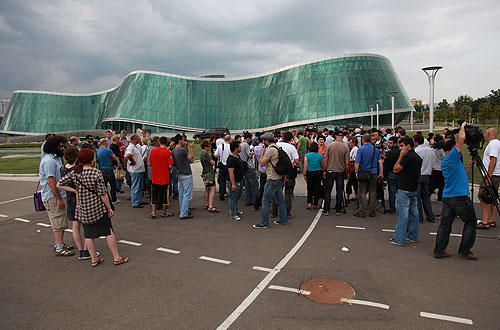Transparency Pledged in Photographers’ Trial

A group of journalists gathered outside the Interior Ministry building in Tbilisi outskirts, July 13. Photo: Guram Muradov/Civil.ge
Except of “small part”, the entire trial into the arrested photojournalists’ case, charged with espionage in favor of Russia, will be open for public, the Georgian authorities pledged on July 13.
A group of media activists and journalists have been actively campaigning calling for lifting the veil of secrecy drawn over the case of arrested photojournalists, which has been classified as “secret”.
On July 13 the chief prosecutor’s office and Interior Minister Vano Merabishvili said that most of the court proceedings into the case would be public.
“The prosecution will file a motion requesting court to hear at a closed session only that small part of evidence, which contains state secrets,” the prosecutor’s office said in a statement.
The Tbilisi City Court has scheduled preliminary hearing into the case for September 1.
Vano Merabishvili told a small group of journalists, mainly those working for the Western news organizations, that most of the court proceedings would be open.
Merabishvili, who insisted that the investigation had enough evidence to prove its case against accused photographers, said that the public scrutiny of those evidence would be possible during the court proceedings “most part of which will be open for the public”, except of those parts at which documents with state secrets would be heard.
On July 13 the Interior Minister also met separately with those media activists and journalists, who led a campaign – involving protest rallies and meetings with Tbilisi-based Western diplomats – to lobby for declassifying the case. After the meeting media activists said that they requested release of arrested photographers on bail, but the request was declined, they said, on the grounds that release might damage ongoing investigation.
Nino Zuriashvili, an investigative reporter, who participated in the meeting with six other colleagues, said that she failed to learn something new from the meeting with the interior Minister, that would have assuaged her doubts over the official version of the case.
Zurab Kurtsikidze, photographer for the Frankfurt-based European Pressphoto Agency (EPA); Irakli Gedenidze, President Saakashvili personal photographer and Giorgi Abdaladze, a freelancer who also was a contract photographer with the Georgian Foreign Ministry and also worked as a stringer for the Associated Press were arrested on July 7 and charged with espionage. Gedenidze’s wife, Natia Gedenidze, was also arrested into the case and released on bail. Preliminarily court hearing is scheduled for September 1.
Interior Minister, Vano Merabishvili, told reporters on July 13, that the investigation had “enough evidence” to suspect that Kurtsikidze had been in contact with the Russian military intelligence operatives since 2004, particularly with Anatoly Sinitsin and Sergey Okrokov.
These two names first emerged in Georgia in 2006 when Georgia arrested four Russian citizens on espionage charges, triggering major spy scandal between Georgia and Russia. At the time the Georgian authorities said that the spy network was coordinated from outside Georgia by Russian military intelligence officer Anatoly Sinitsin.
Merabishvili also said that there were evidence to suspect that Kurtsikidze made dozens of phone contacts with the Russian military intelligence operatives since 2004.
Nino Danelia, a member of the Georgian Public Broadcaster’s board of trustees, who was among the group of media activists, which met with Merabishvili, said that they had been shown telephone records through which the Interior Ministry was suggesting that Kurtsikidze was in contact with the Russian intelligence officers.
“We’ve been told that in 2004 phone calls were made to GRU agents from a mobile phone, which at the time was not registered on Mr. Kurtsikidze’s name – it was registered to an elderly woman living in Tskhinvali; some time later the phone number became registered on Mr. Kurtsikidze,” Danelia told Tbilisi-based Maestro TV on July 13, adding that the Interior Minister declined to show and tell other evidence at this stage citing ongoing investigation.
Lasha Tugushi, editor of the daily Rezonansi, who also attended the meeting with the Interior Minister said that the authorities July 13 statement that the court proceedings would be open for the public was partly also a result of the campaign by media advocacy coalition. He said that the campaign should continue to further monitor the process.
Merabishvili told reporters on July 13 that charges against Kurtsikidze, who worked for the Frankfurt-based European Pressphoto Agency (EPA) did not meant that investigators were suspecting that his agency or EPA’s any other employ was also involved into the case; he said that EPA had nothing to do with the case.